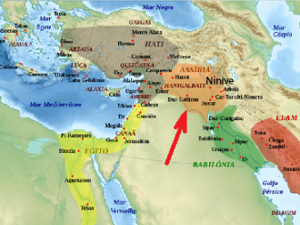
The pandemic and the sign of Jonah
Nínive (present-day Mossum) was one of the largest cities during the Assyrian reign, by the standards of the time it had more than 100,000 inhabitants and was quite extensive since the Bible reveals that Jonas took 3 days to explore it and ask for the change of conduct of its inhabitants.
reign, by the standards of the time it had more than 100,000 inhabitants and was quite extensive since the Bible reveals that Jonas took 3 days to explore it and ask for the change of conduct of its inhabitants.
The date on which the preaching took place in Nineveh is uncertain and the author of the book that bears the name of this prophet is also unknown, but as it refers to the reign of Jeroboam II as king of Israel, the date must be between the years 700 and 742 BC, by writing the text in Aramaic typical of late Hebrew, both in style and in grammar, it is post-exile which means between 722 and 742 BC
From the end of the 17th century BC (when the Neoassirian Empire fell), until the middle of the 7th century, it was a geopolitical entity, ruled by other peoples, the Assyrians were known for their wickedness and violence, where they could even kill for debt, and the biblical narrative said that the prophet Jonah, who was to preach and ask for the change and conversion of the people, was afraid to do his mission.
It is not known for sure what was the plague that could come to the people there, but the people including the king all changed their attitude and converted, and the plague did not happen in that region, the current pandemic already has its sign of changing habits and the demand for solidarity with everyone, but there are still those who think that the pandemic will pass without any change in attitude.
The history books do not record exactly what the change was, but it was during the government of Assurbanipal, son Assaradão, who died in 667 BC, that Assiria lived its most profitable period, including the first Library of history, precisely the Library of Nineveh, which is where thousands of texts are found (chronicles, royal letters, decrees, religion, myths and many others) written on a baked clay tablet.
The change that we need not only to avoid the number of deaths that grows, ranges from personal habits to the concern with food and life maintenance of those who no longer had jobs, those who now do not have and those who must lose with the growth of pandemic.
For those who believe, they must also rethink what they believe and experience what they believe, otherwise it is just a legend or fable told as a beautiful story.









